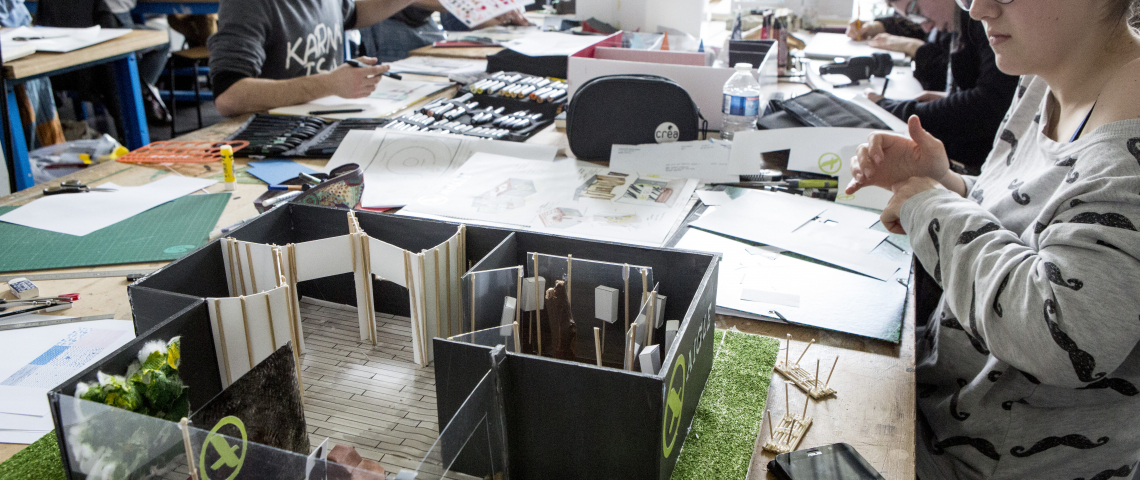The focus of the call for “innovative initial education” projects, launched at the end of 2016, was short-format, inter-institutional modules at the intersection of the creative disciplines (art, design, architecture), digital sciences, engineering and/or human and social sciences.
The key selection criteria were: original interdisciplinary collaborations on emerging subjects, and official inclusion of modules in educational programmes. This call was addressed to the programme’s partner institutions but allowed for the involvement of other institutions, or social and economic stakeholders in the Loire region.
Ouest Industries Créatives** selected eight projects:
Robotic Interaction
ESBA TALM and IUT Nantes (mechanical engineering department) put forward a proposal for a workshop on robotic large-scale production. Students will be invited to think about the design process in this approach to production when applied to design or architecture, through the creation of a large-scale structure.
Learn more about Robotic Interaction
iCreaTe
This module places technology at the centre of a hybrid interdisciplinary approach and involves students from various fields: engineers from Polytech, designers from the École de Design Nantes Atlantique and communication experts from Audencia SciencesCom. Working with an ethos of cooperation, students will examine and trial different technologies in order to represent a dataset supplied by a company, media or organisation.
SHS_Creative Professions
A module from the Université d’Angers and the École de Design Nantes Atlantique developed to enable students of design, geography and economics to pool their skills. Students are expected to compare investigative (social & human sciences) and data visualisation (creative) tools to find the most effective way to work out, illustrate or question a problem.
Discover more about SHS_creative professions
Not a Number (NaN)
This collaborative project between ESBA TALM (École Supérieure des Beaux-Arts Tours-Angers-Le Mans) and the Université d’Angers (École d’Ingénieurs ISTIA) introduces arts students to the basics of digital technology and engineering students to the concept of creativity.
Design of digital mediation approaches
Led by IUT la Roche-sur-Yon and the École de Design de Nantes Atlantique, this project is a continuation of the “Book in Five Years Time” cycle (partnership with Mobilis and Stereolux). It will enhance the initial project by creating a shared, cross-disciplinary methodological tool for students from three different disciplines (publishing, interactive design, running online communities) who are tasked with developing and trialling new uses for books and reading.
Read more about Design of digital mediation approaches
Revitalisating a town centre
This educational module will engage students from ENSA Nantes and the École de Design Nantes-Atlantique in the design and installation of scale 1 prototypes of micro-architectural structures and street furniture. These prototypes will be placed in public spaces in rural town centres.
Parulie Parure
This project is the first joint venture in the field of textiles and fashion education between the Université d’Angers (UFR ESTHUA, Tourisme & Culture) and ESAD-TALM Angers (Ecole Supérieure d’Art et de Design). Its goal is to pool the skills and knowledge of students of both disciplines, to create items that include textile components and make use of a range of traditional and contemporary techniques.
#iWave
The #iWave project aims to bring students from IUT Laval and the École de Design Nantes Atlantique together to design and develop a “proof of concept” web app. Students are expected to give in-depth thought to ways of using and interacting with data, with genuine consideration for users. The project’s objective is to create an environment that fosters the development of joint, distance-learning projects and which can be easily rolled out.
* The three regional universities, ENSA Nantes, Ecole de Design Nantes Atlantique, ESBA-TALM, Ecole Centrale de Nantes, Audencia Business and SciencesCom.
** RFI Ouest Industries Créatives receives funding from the Pays de la Loire regional authorities and the ERDF.


